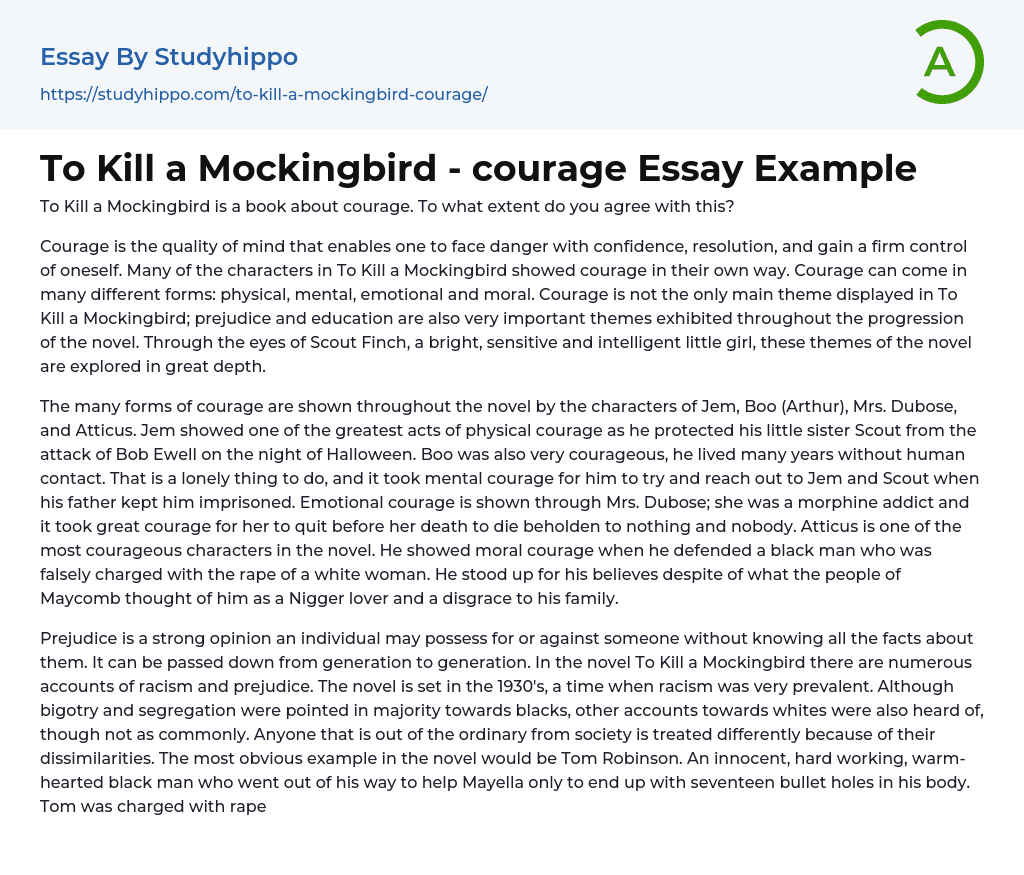"To Kill a Mockingbird" is a book that delves into the theme of courage. The characters in the novel showcase various forms of courage, including physical, mental, emotional, and moral. Additionally, prejudice and education are significant themes throughout the story. Through Scout Finch's perspective - a young and intelligent girl - these themes are thoroughly examined. Characters like Jem, Boo (Arthur), Mrs. Dubose, and Atticus exemplify different types of courage throughout the narrative. Jem exhibits physical bravery when he defends his sister from an attack. Boo demonstrates mental bravery by reaching out to Jem and Scout despite years of isolation. Mrs. Dubose displays emotional bravery as she overcomes her addiction before passing away. Lastly, Atticus - one of the most courageous characters in the novel - embodies moral courage.
In "To Kill a Mockingbird," protagonist Atticus showcases moral c
...ourage as he defends a black man falsely accused of raping a white woman. Despite being labeled with derogatory terms like "Nigger lover" and bringing disgrace to his family name, Atticus remains unwavering in his beliefs. This highlights the prevalence of prejudice during the 1930s when racism was widespread. The novel sheds light on numerous instances of racism and bias, where discrimination is passed down through generations. While bigotry primarily targets African-Americans, there are also lesser-known cases of prejudice towards whites who associate with blacksTom Robinson, a diligent and innocent black man, exemplifies the racial intolerance prevalent during this time. Regardless of his kind nature and eagerness to assist Mayella, Tom is unjustly accused of rape and ultimately murdered due to his skin color. Atticus and Mr. Dolphus Raymond also face mistreatment for their belief in desegregation during
this era of accepted racism. To avoid explaining his love for a black woman, Mr. Dolphus Raymond pretends to be drunk, claiming that alcohol provides an excuse for his actions to be dismissed. Despite being ridiculed and compared unfavorably by Mrs. Dubose to the people he worked for, Atticus defends Tom Robinson out of unwavering conviction. Aunt Alexandra introduces Jem and Scout to social prejudice by forbidding them from playing with Walter Cunningham due to his family's farming background, deeming him socially inferior. This theme of class-based prejudice permeates throughout the novel.
Education is another theme explored in the story - both formal education at school and life lessons gained through experiences are mentioned. Initially naive and unaware of society's harsh realities, Jem and Scout mature as they encounter various situations that teach them appearances can be deceiving. A prime example is Boo Radley - initially perceived as a malevolent phantom by the children but gradually revealed as a gentle-hearted individual who leaves gifts in the tree's knothole for them.He treated them as his own children and acted as a brave hero who rescued them from Bob Ewell's evil clutches. They discovered that he was a harmless and generous mockingbird, but others condemned him due to his differences. At first, Mrs. Dubose seemed like a grouchy old woman who only mistreated people. However, Jem and Scout soon discovered that she was addicted to morphine and desired to quit before her death, wanting to die free. They learned that she was sick and displayed remarkable emotional courage and willpower.
Initially, Mr. Dolphus Raymond appeared to be a drunkard who only associated with African Americans. Later, Jem and Scout
discovered that he actually only drank Coca-Cola but pretended to be drunk all the time. He dismissed the narrow-minded prejudice that people had against African Americans and pretended to be intoxicated to provide the white residents of Maycomb with an excuse to accept his lifestyle.
Since they couldn't understand why someone would prefer the company of black individuals over white ones, Mr. Dolphus Raymond's pretense of drunkenness gave them insight into his perspective.
While To Kill a Mockingbird primarily revolves around courage, it also delves into many other important themes.The novel is abundant in morals and ethical considerations as it delves into these themes. The purpose of modern education is to motivate individuals to exhibit bravery when confronting life's obstacles, eradicate racism, consistently show empathy towards others, and acquire valuable knowledge from life's experiences.
- Values of Life essays
- Ethical dilemma essays
- Normative Ethics essays
- Virtue Ethics essays
- Belief essays
- Deontology essays
- Moral essays
- Virtue essays
- Work Ethic essays
- Malcolm X essays
- Black Lives Matter essays
- Antisemitism essays
- Ku Klux Klan essays
- Miscegenation essays
- Racial Segregation essays
- I Have a Dream essays
- Martin Luther King essays
- Racial Inequality essays
- Black History Month essays
- Black People essays
- Ambition essays
- Anger essays
- Betrayal essays
- Boredom essays
- Confidence essays
- Courage essays
- Desire essays
- Disgrace essays
- Doubt essays
- Empathy essays
- Fairness essays
- Fear essays
- Feeling essays
- Forgiveness essays
- Grief essays
- Guilt essays
- Happiness essays
- Harmony essays
- Hate essays
- Honesty essays
- Honor essays
- Hope essays
- Humanity essays
- Inspiration essays
- Kindness essays
- Laughter essays
- Loneliness essays
- Lost essays
- Loyalty essays
- Need essays




